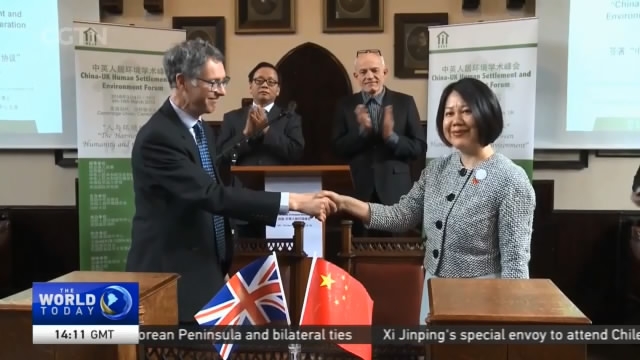
22:41, 10-Mar-2018
Sino-UK Human Settlement Forum: Chinese & British experts meet on sustainable cities

Chinese and British design and planning experts have reached an agreement on how to work together for healthier, safer, and more sustainable cities. CGTN's Xi Jia tells us more.
XI JIA CAMBRIDGE "Integration of the universe and humanity, a theory raised 2,000 years ago by Chinese philosopher Laozi, is once again in the spotlight. Good design not only sets apart one's home, but adds value to the way of life. The purpose is to build homes and at the same time, optimize comfort with a sense of environmental protection."
Under the backdrop of the Belt and Road Initiative, the Sino-British Cooperation Agreement on Habitat Environment Research has finally been signed and a cooperative laboratory established. China and the UK bring to the table their own vast experience in dealing with environmental and heritage protection, related to people's better living. But there's always room to grow, and there's much each nation can learn from the other.
DR. LI LING, EXECUTIVE CHAIR HUMAN SETTLEMENT & ENVIRONMENT FORUM "Our advantage is that when facing serious environmental problems, we can always have a very quick policy decision by holding meetings. I have been here in Cambridge for many years. I found that the transportation here has really become a problem. If we put the same thing in China's Shenzhen or other cities, it will be solved very quickly. But here in the UK, they are still having discussions on the issue."
And for China, maintaining older architecture and incorporating it seamlessly into modern cities is something the nation could learn from the UK. Design of the future was also a topic at the China-UK Human Settlement Environment Forum. According to experts, so-called lighter houses are the way forward. Materials to build homes will be more high tech, environmentally friendly, and convenient for living.
HONG ZHONGXUAN, MANAGING DIRECTOR HHD INTERNATIONAL DESIGN GROUP "Just like trees in the forest, houses should not be built anymore, but should grow naturally on their own."
DR. WILLIAM FAWCETT, CHAIR CAMBRIDGE ARCHITECTURE RESEARCH "I think new materials will make a huge impact on what's possible and what could be done. I think new opportunities will come with new materials."
In the future, all the elements of a house will be packed in a big suitcase. Package the assembly parts and voila! You have your new home. This sort of house can be easily moved from one place to another, particularly useful for the homeless and those affected by natural disasters. Xi Jia, CGTN, Cambridge.

SITEMAP
Copyright © 2018 CGTN. Beijing ICP prepared NO.16065310-3
Copyright © 2018 CGTN. Beijing ICP prepared NO.16065310-3